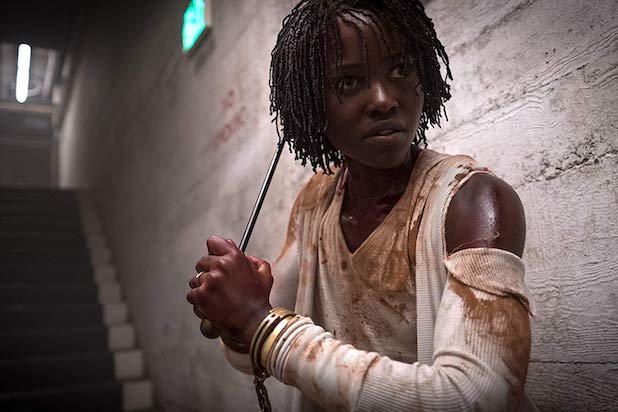
 Jordan Peele’s horror film, about people encountering their murderous doubles, has a dark social critique underlying its frightful surface.
Jordan Peele’s horror film, about people encountering their murderous doubles, has a dark social critique underlying its frightful surface.
Jordan Peele has followed up his smash hit debut Get Out with another horror film, this one with a much less comic flavor, simply called Us. The deceptively short title belies the writer-director’s complicated intent.
The picture opens in the 1980s, with a little black girl named Adelaide on vacation with her parents at a carnival near the beach at Santa Cruz. She wanders away from her Mom & Dad, entering a spooky house of mirrors where she encounters her double—not a reflection from one of the mirrors, but an actual double. The movie delays showing us what happened next, but she gets traumatized for life, never being quite the same again.
Cut to the present day, when the adult Adelaide, played by Lupita Nyong’o, is married with two kids, a daughter and son, who appear to be around 13 and 10 years old. The husband Gabe, played by Winston Duke, wants the family to go to the beach at Santa Cruz, against the vague misgivings of Adelaide, and they do. Terror strikes when their doubles, a family of four looking exactly like them and wearing red jump suits, invade their vacation rental seeking to kill them.
The theme of the double is an old one in the horror genre. Since we’re so used to special effects in movies by now, the idea of how scary it would be to meet a stranger who is your double may be less familiar than it used to be. Peele amps it up to maximum intensity, with effects that are similar, yet not exactly the same, as Night of the Living Dead and Invasion of the Body Snatchers, just to give two examples. But the chase scenes and the extremely bloody violence remind me more of slasher films, and I suppose this is part of the deal if you’re making a blockbuster horror film these days, at least for this director, which I think tends to become exhausting and numbing after a while. But fortunately, unlike most slasher films, Us has something on its mind, and discovering what that might be is part of the fun of this game.
Lupita Nyong’o does great work here as Adelaide, and her double, who speaks in a scary hollow-sounding voice with creepy hesitations in the middle of words. Of course they’d seen each other before in the house of mirrors, the question is—why has she returned with a family of doubles, and who or what are they anyway? Thinking about the movie later, the first thing I thought of was “double consciousness,” a phrase used by the great black intellectual W.E.B. Du Bois to describe how African Americans see themselves, both through their own eyes and through the eyes of white society. However, in the movie there’s a white family staying nearby, with parents played by Elisabeth Moss and Tim Heidecker, and they’re also threatened by doubles—so Peele’s main point has to do with something other than race. And with an intriguing use of symbolism, some plain and some rather mysterious, the film confirms my intuition. That’s all I’m willing to say. It’s best to go in without preconceptions and see how the drama affects you. The heightened awareness brought on by the constant threat of violence can become a conscious burden, and that too, I think, is part of the point.
After a successful debut, a director’s second feature sometimes overreaches and tries too hard. There’s a little bit of that here, but Us is the rare horror film with a deadly serious theme, and it carries a message worth hearing. Notice also the spelling of the title: U.S.—I believe this movie consciously reflects our frightening American predicament.






